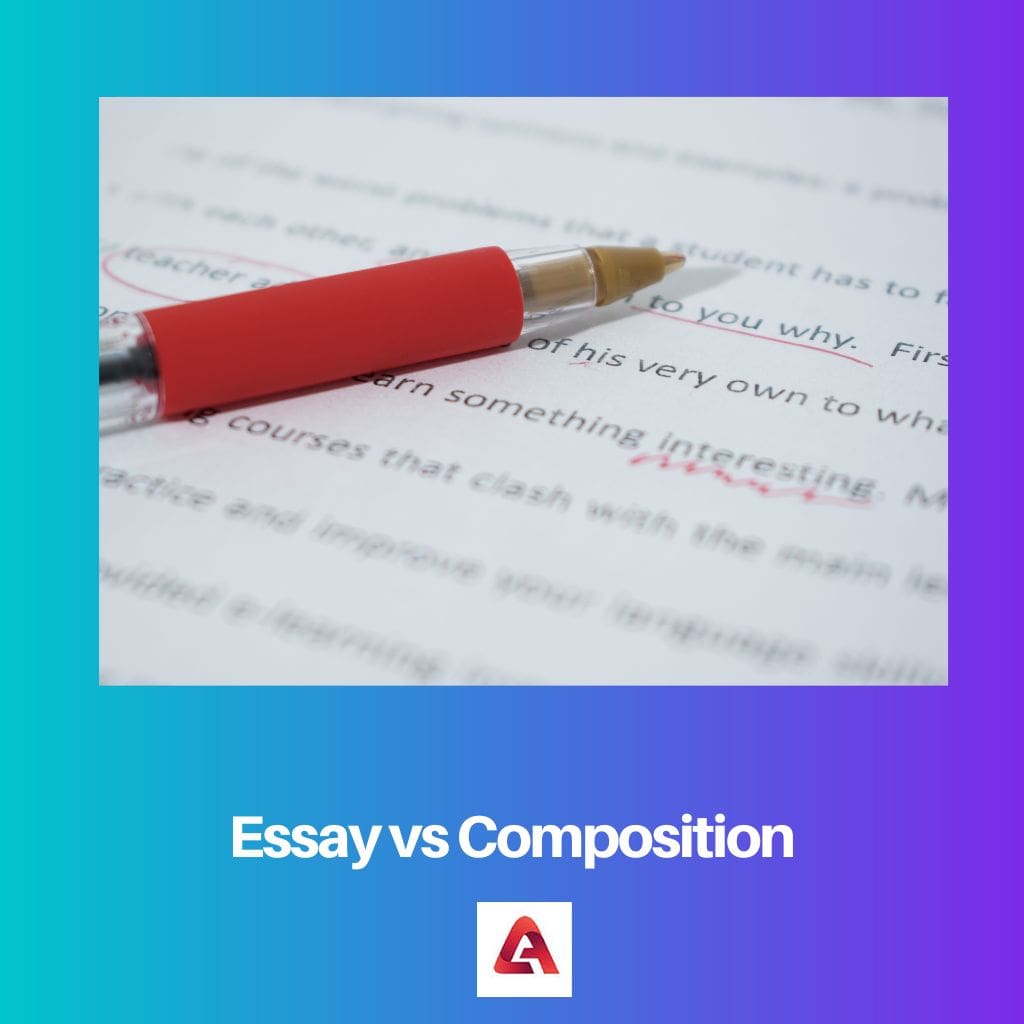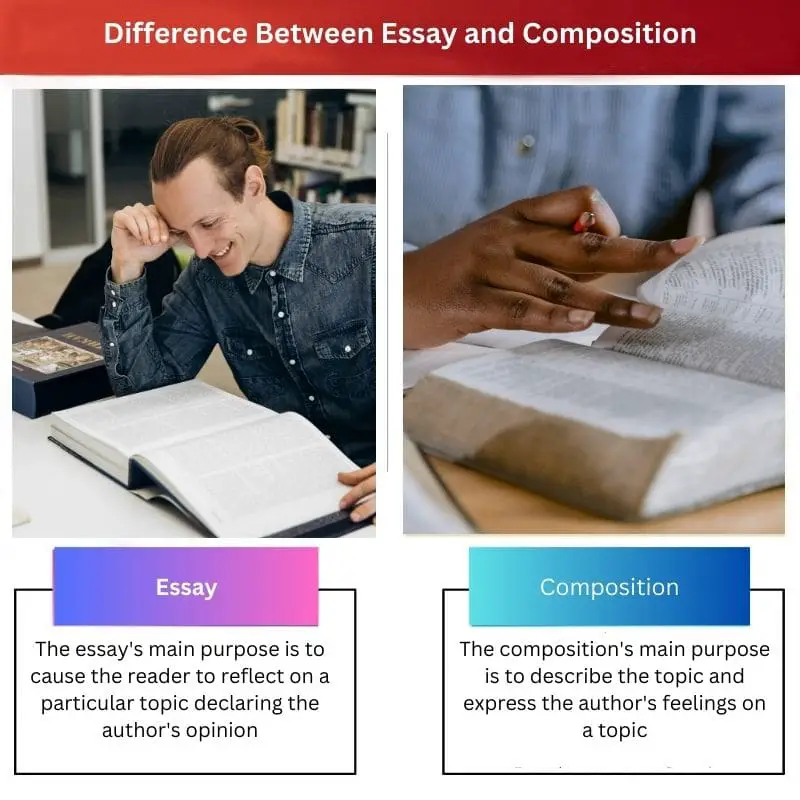Some students make a mistake, thinking an essay and composition are synonymous. These terms are not contrary on the one side, and on the other side, there is a significant distinction between them.
Key Takeaways
- Essay and composition are both forms of academic writing that require critical thinking, analysis, and effective communication; essay is a more specific term that refers to a piece of writing that presents a thesis statement and supports it with evidence and analysis.
- The composition can encompass various types of writing, including essays, narratives, and descriptive pieces; an essay is a specific type of composition with a more structured format.
- An essay includes an introduction, body paragraphs, and a conclusion, while composition may not have a specific structure or format.
Essay vs. Composition
Essays are about the writer’s opinion on a particular topic. They are structured and follow patterns, including an introduction, a body paragraph, and a conclusion. The composition can be about any topic, and it is not structured. It is not about any specific opinion or argument.

As such, essay and composition are not interchangeable terms. They also have different writing purposes. An essay aims to push readership to develop their position on a topic. A composition explains the topic and compares phenomena without declaring the author’s position.
An essay is a text of a small volume (sometimes a college essay can be up to 7-10 pages long, but usually, the required volume is not more than 2-3 pages). The essay is written in a prosaic style. In an essay, the author states his personal opinion on a topic.
The author can express his vision in a free form. In an essay, the author is speaking on a particular phenomenon, event, or opinion that is reasoning with his view. The essay requires not only gathering specific relevant information but also adding it to your thoughts and arguments.
This is not a one-day job for most students. That is why they apply to paper writing services for help from skilled professional writers. These services aim to teach students how to explain their thoughts and structure their essays correctly.
The work created with the help of writing services is a completed essay that can be added to the student’s impressions. The composition is a creative paper presenting the author’s thoughts and feelings on the topic without explaining his opinion.
For example, the composition topic about the Great Depression is “Franklin D. Roosevelt’s role during the Great Depression.” The essay topic about the Great Depression will be: “Did the New Deal solve the problem of the Great Depression?”
Comparison Table
| Parameters of Comparison | Essay | Composition |
|---|---|---|
| Purpose of Writing | The essay’s main purpose is to cause the reader to reflect on a particular topic declaring the author’s opinion. | The composition’s main purpose is to describe the topic and express the author’s feelings. |
| Author’s vision on the topic | An author’s position and thoughts on the current topic must be clearly understood from the essay. | The author can follow another author’s thoughts without adding his opinion on the composition’s subject. |
| Structure | The essay structure is not strong and can vary depending on the topic | The composition must follow a specific outline: introduction, body, and conclusion |
| Volume | Usually 2-3 pages (about 1500 words) | Usually larger than an essay – about 3-5 pages (1500-3000 words) |
| Style | States the author’s position on a current topic clearly, and reveals the author’s mindset, visions, impressions, opinion | Analyzes the existing sources on the topic, expresses and compares other authors’ thoughts, expresses the author’s feelings about another author’s opinion |
What is Essay?
This genre has recently become popular, but its roots date back to the 16th century. Today, the essay is offered as a college and university assignment. An essay is a type of work built around a central topic.
The main purpose of writing an essay is to provoke the reader into reflection. Writing an essay allows learning to formulate your thoughts, structure information, find arguments, express the individual impression, and formulate your position.
The characteristics of an essay are a small volume, a specific topic, and free composition. The author must build a trusting relationship with the reader; therefore, writing an essay is much more difficult than writing a composition.

What is Composition?
A composition is a creative work, on a prescribed topic. It has a clear presentation structure.
In the composition, you can agree or disagree with the opinion of other authors, express your thoughts about what you read, compare works of different authors, and analyze their vision. A composition is expected to provide full disclosure of the topic.
To provide it, the paper must follow a set structure: an introduction that outlines the essential problem of the topic. This body explains and reveals the main idea of the composition and a logical conclusion. Therefore, a composition has a larger volume than an essay.

Main Differences Between An Essay And Composition
- There is a significant difference in style. A composition contains the analysis of the topic. At the same time, the author’s position is clearly expressed in the essay.
- Compositions and essays vary in length. The essay, most often, has a small volume because the author’s thoughts must be clearly stated. The composition has a prescribed structure and a larger volume.
- An essay allows the author to express creativity and show his vision and attitude toward a specific phenomenon. A composition explains the topic according to its concept and doesn’t have to be supplemented with unusual thoughts.
- To write an essay, finding an original idea or developing an out-of-the-box view of a situation is significant. At the same time, writing a composition requires reading about the topic and talking about it.




